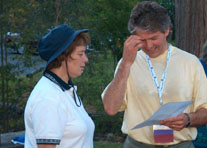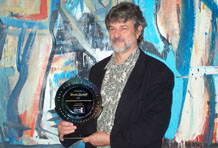
|
{
C O N T E N T S } Download Newsletter pdf |
|
ISMB 2003 Celebrates Bioinformatics Down Under
ISMB marked its 11th year by venturing beyond North America and Europe to Brisbane, Australia from June 29 to July 3, 2003. The conference attracted 919 participants from 42 countries to its quality program of papers, posters, tutorials, special interest group meetings, and more. The Institute for Molecular Bioscience and the Advanced Computational Modelling Centre of the University of Queensland served as local hosts for the meeting, which was held at the Brisbane Conference and Exhibition Centre. More than 500 participants took part in 15 tutorials on both established and cutting-edge topics relevant to the bioinformatics field, including "Bioethics for Bioinformaticists", "Molecular Modeling: building a 3D protein structure from its sequence", "Artificial Intelligence and Machine Learning Techniques for Bioinformatics", and "Data Warehousing in Molecular Biology". The Special Interest Group meetings also proved popular this year, with 98 participating in Bioinformatics Open Source Conference, 100 in Biopathways, 51 in Bio-Ontologies, 28 in WEB03, and 42 in Text Mining (BioLINK).
Once again, attendees had the opportunity to participate in the popular Orienteering Ice Breaker. The event, a tradition initiated at ISMB2002, involved finding control locations in a Brisbane city park using a map and a compass. Ironically, according to the ISMB website, the event is analogous to the NP-complete Prize Collecting Traveling Salesman problem, which has a respectable and fascinating literature, as well as mostly untapped applications in bioinformatics. ISMB concluded with a party at Dreamworld on the Gold Coast, where attendees enjoyed entertainment, wild rides, and wildlife. Notable speakers
at ISMB 2003 included: Sydney Brenner, one of three recipients of
the 2002 Nobel Prize in medicine and founder of the Molecular Sciences
Institute and distinguished research professor, Salk Institute;
David Haussler, Howard Hughes Medical Institute Investigator and
professor of computer and information sciences, University of California,
Santa Cruz; Yoshihide Hayashizaki, project director of Genome Exploration
Research Group, Genomic Sciences Center, RIKEN; John Mattick, director
of the Institute for Molecular Bioscience, University of Queensland;
Ron Shamir, professor of computer science, Tel-Aviv University,
and Michael Waterman, professor of mathematics, computer science
and biological science, University of Southern California.
W. James Kent, the 2003 winner of the Overton Prize delivered the annual Overton Lecture. Kent is an assistant research scientist at the University of California, Santa Cruz. The prize, now in its third year, is awarded for outstanding accomplishment to a scientist in the early- to mid- stage of his or her career who has already made a significant contribution to the field of computational biology. The winner of the first-ever ISCB Senior Scientist Accomplishment Award was David Sankoff, Canada Research Chair in Mathematical Genomics at the University of Ottawa and a member of the Centre de Recherches Mathématiques at the Université de Montréal. The Senior Scientist Accomplishment Award recognizes members of the computational biology community who are more than 12 to 15 years post-degree and have made major contributions to the field of computational biology. (See www.iscb.org/newsletter6-2/ for more information on Kent’s and Sankoff’s research and selection for these awards.) Both industry and governmental sponsors provided invaluable support for ISMB 2003. Platinum Sponsors included: Hewlett-Packard, Queensland Government - Dept of Innovation and Information Economy, and Sun Microsystems, Inc. Gold Sponsors included: Apple Computer Australia, SGI, and The University of Queensland. Silver Sponsors included The Australian Partnership for Advanced Computing (APAC) and Queensland Parallel Supercomputing Foundation Ltd. Travel fellowship support, which allows students and early-career scientists to attend ISMB, was provided by the United States Department of Energy, the United States National Institutes of Health, the United States National Science Foundation, and the ISCB. |



